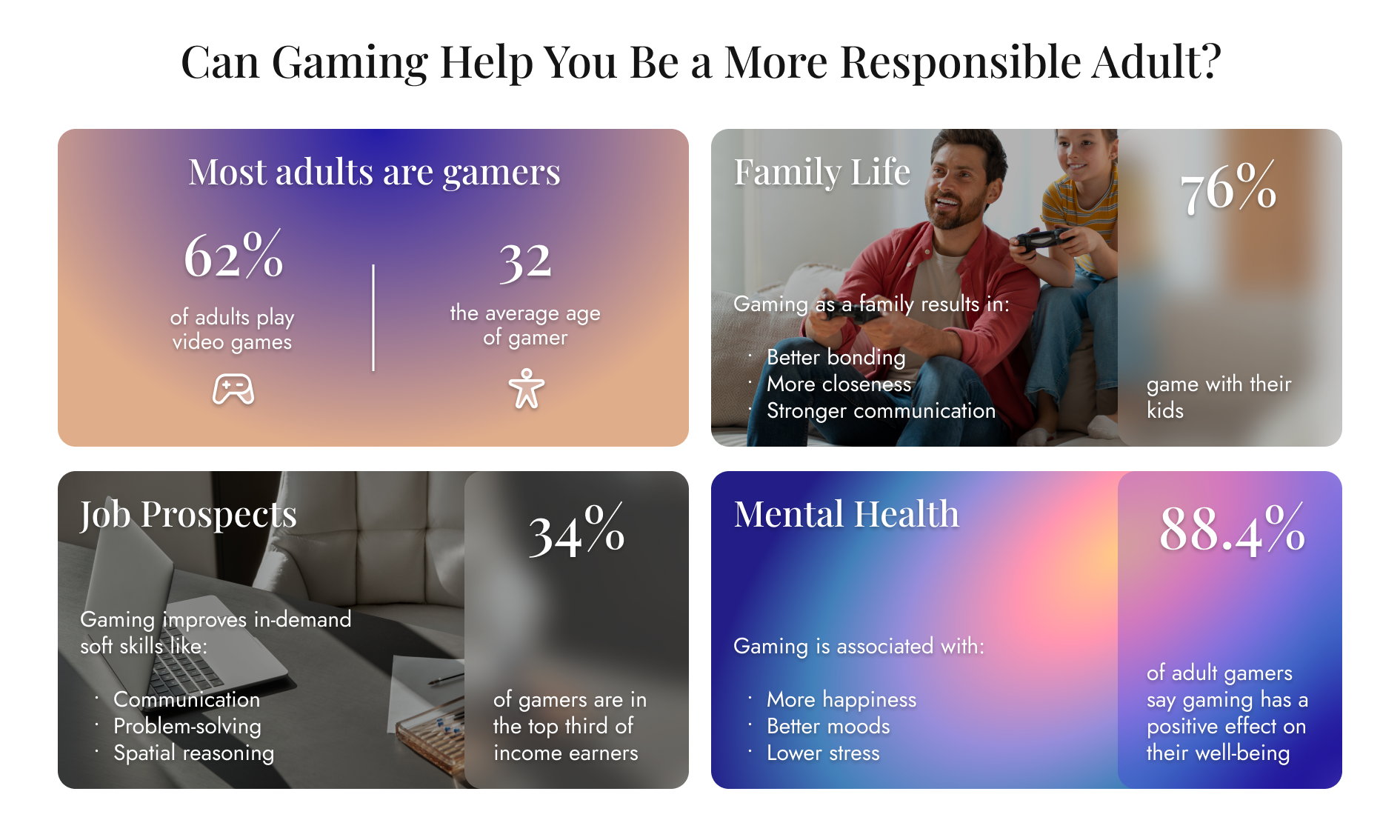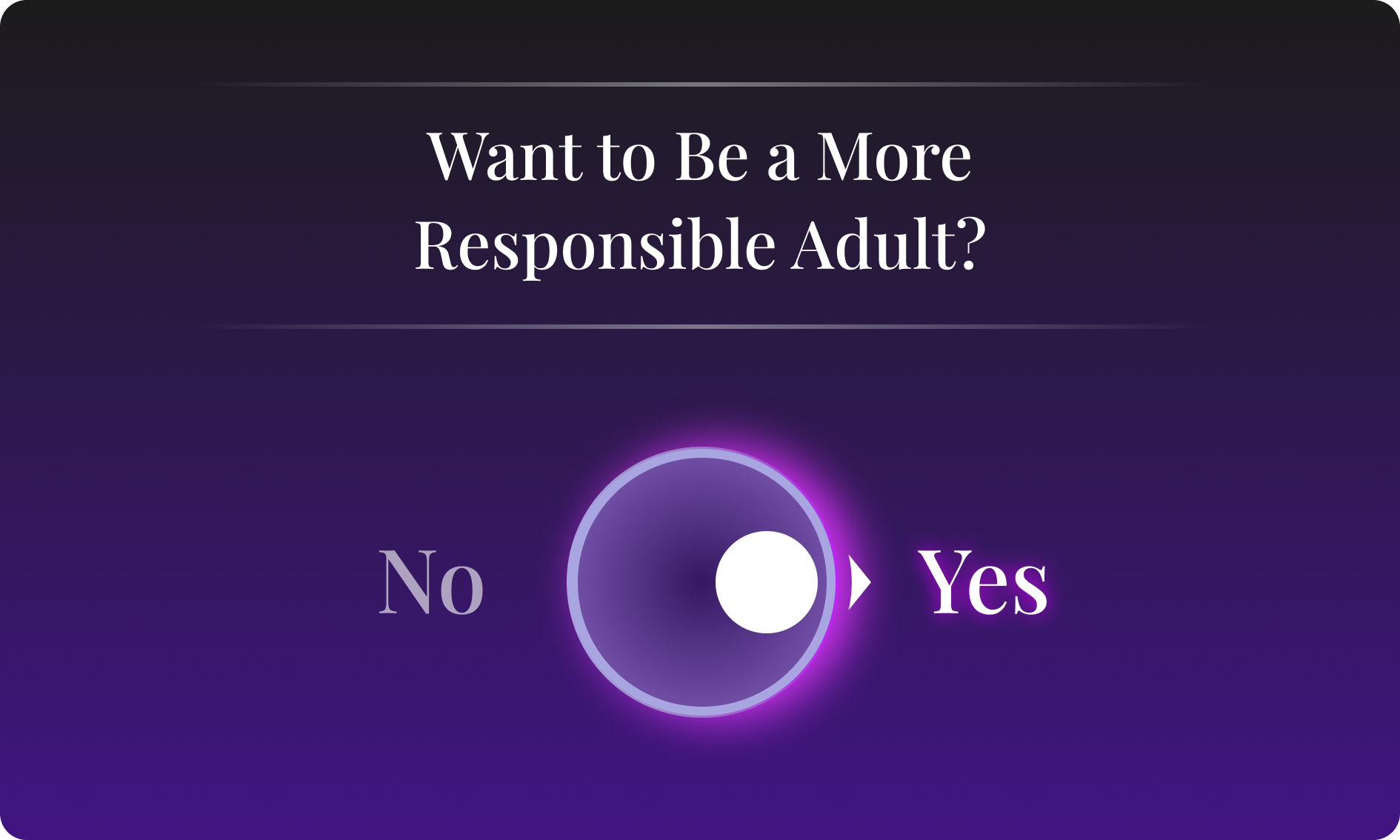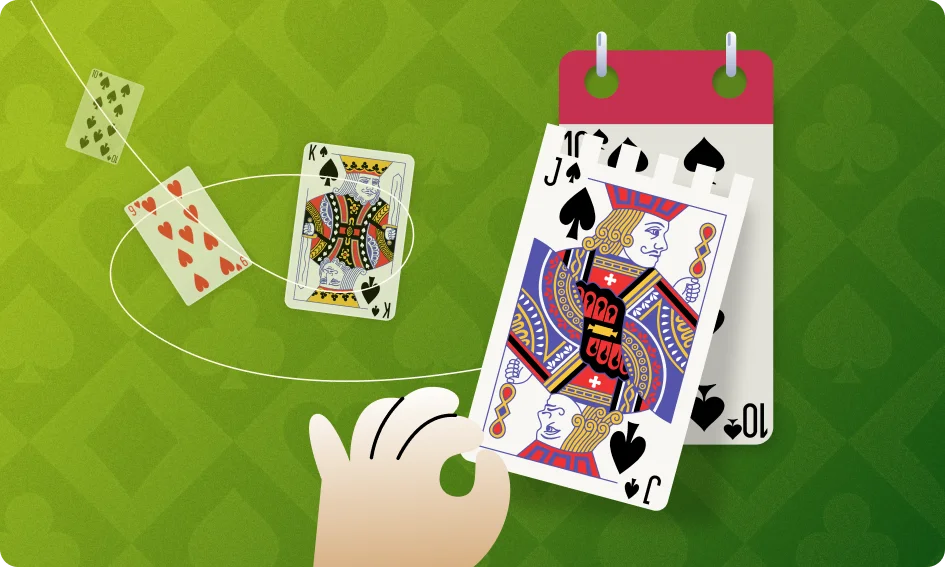When you think of an adult gamer, what do you picture?
You might imagine someone sitting alone in a dark basement, lit only by the glow of the RGB lighting on their gaming PC.
Someone who’s too lazy to hold down a steady job. Perhaps they neglect their family because they’re too busy immersing themselves in online worlds.
Maybe they can’t peel themselves off the couch because they’re depressed, anxious, and completely lacking in ambition.
That’s a stereotype we’re all very familiar with.
It’s also completely wrong. At least, according to the scientific research on adult gamers.
We wanted to better understand how playing video games affects adults. So, we looked at the effects of gaming on three key areas of life: family, work, and personal wellbeing.
And the findings paint a very optimistic picture of what it means to be an adult gamer.
Gaming Can Make You a Better Parent
According to a report by the Entertainment Software Association, 62% of adults play video games, and the average age of a gamer is 32 years old.
With so many adult gamers, it’s not surprising that many of them turn it into a family activity. In fact, 76% of parents report that they play video games with their kids.
That’s great news, because research shows that the more a family plays video games together, the higher their level of bonding and closeness. Cooperative video games have also been shown to help families that struggle with communication.
Does that mean being a gamer makes someone a better parent? Well, not necessarily.
But since most adult gamers play with their kids, it’s safe to say that it’s likely to bring the family closer and strengthen those important relationships.
Gaming Can Improve Your Career Prospects
Okay, so gaming can be good for your family life. But what about your job?
Unsurprisingly, professionals of all types are represented among gamers. In fact, there are some correlations between a gamer’s job and the types of games they play.
One extensive research paper found that IT professionals gravitated toward games with complex rules and puzzle elements. Engineers favored strategy games that involve a lot of planning and organizing. Managers, meanwhile, preferred to play online roleplaying games in multiplayer environments.
That so many professionals play video games is not a coincidence. In fact, it might be what helped them secure those jobs in the first place.
Research has demonstrated that gaming can boost cognition. Playing video games has been shown to improve memory, spatial reasoning, and emotional self-regulation – all of which are essential for a successful career.
Gaming also helps in the development of a number of soft skills. Multiplayer games encourage teamwork, collaboration, and communication. Action games involve quick thinking and rapid problem-solving. Strategy games require risk management, deliberation, and self-control. All of which are traits that are highly sought after by employers across a range of industries.
Interestingly, gamers are evenly distributed across income levels. 34% of gamers are in the top third of income earnings, another 34% are in the bottom third, with the remaining 32% in the middle tier.
This shows that gaming, at the very least, doesn’t significantly interfere with work for most gamers and has no negative impact on their earning potential. Otherwise, we’d see gamers more heavily represented in the lower income brackets.
Contrary to the stereotype of adult gamers being unemployed slackers, a large portion of gamers are gainfully employed. Not only that, but many of them may have their current job thanks to the skills they acquired from online gaming.

Gaming Can Improve Your Well-Being
Now, what about the effects of video games on the gamers themselves?
Well, those are overwhelmingly positive too.
One survey found that 88.4% of adult gamers feel that their hobby improves both their emotional and psychological wellbeing.
Another study tracked the hours gamers logged in two games (Plants vs. Zombies and Animal Crossing) and compared it to how well they were doing overall. The more time those adults spent gaming, the more likely they were to report positive well-being.
The evidence all points in the same direction. Adults who indulge in video games report more happiness, improved moods, and a better handle on stress.
There is one major caveat, however. It all depends on how much sleep they get.
A recent study found that adults who play video games for up to 7 hours per week don’t have any problem sleeping. Those who have less control over their gaming habits, however, struggle to get a full night’s rest. And insufficient sleep has a very negative impact on well-being.
As it turns out, the type of game makes a big difference.
First-person shooters and other action games are emotionally arousing. Playing them before bed doesn’t give the brain enough time to relax and come down from that heightened state. This results in a lower quality sleep and less sleep overall.
Conversely, games that are cognitively challenging but don’t involve high levels of emotional excitement, like Solitaire and puzzle games, can actually help with sleep. In fact, they’ve been shown to help adults who struggle with disordered sleep get a more restful night.
So with the right approach to gaming, adults can enjoy all the emotional and psychological benefits of playing video games without having it encroach on the sleep they need.
Gaming for More Success in Life and Work
Overall, it’s clear that adult gamers tend to benefit from their hobby. The research shows that habitual gaming isn’t detrimental to one’s life or career, and could actually help both.
Gaming can help develop soft skills and improve job prospects. It can help parents bond with their children and foster a better home life. It can also improve their wellbeing and even their sleep.
Not only that, but video games are just plain fun. It’s a win-win situation if there ever was one.
But moderation is the key. All of those benefits go out the window for people who can’t control their gaming habits. When habitual gaming becomes a gaming addiction, everything suffers – work, family, and mental health.
The good news is that disordered gaming is relatively rare in adults. Even avid gamers tend to tone down their gaming as they get older and have more responsibilities to deal with.
Still, it’s a good idea for every gamer to keep an eye on their habits to make sure they don’t get out of hand.
Here are some basic recommendations based on the available scientific research:
- Keep gaming to 7 hours a week or less
- Avoid playing more than 4 hours in a single day
- In the evenings, opt for non-arousing video games like puzzle games, card games, and strategy games
- Impose strict limits on your gaming if you have an addictive personality (other types of addiction are a strong predictor for gaming addiction)
As long as you can keep it in check, don’t feel guilty for logging on and playing a game for an hour each day. It might just be what helps you get better at your job and feel closer with your kids.







